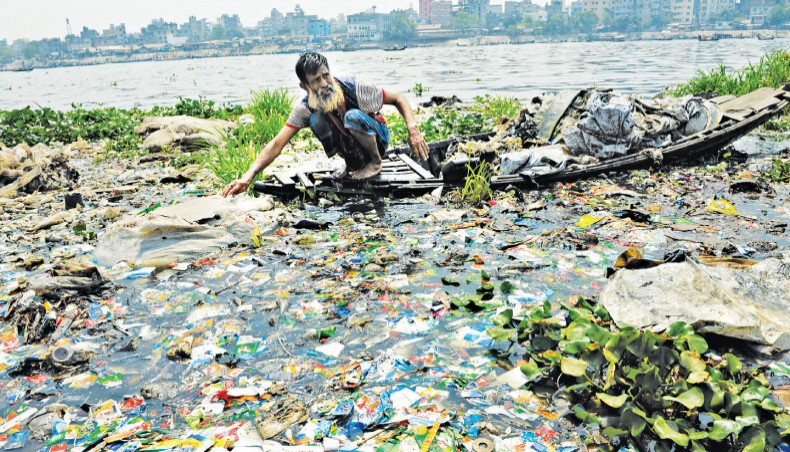Waterbody grabbing goes unabated
Conservation and restoration of water bodies became an elusive task in the country as there seems to be none to stop the greedy land grabbers.
Conservationist expressed deep concern over the issue as the nation is preparing to celebrate the World Water Day on March 27.
The other nations are celebrating the day today.
This year’s theme–‘Nature for Water’ is set for nature-based solution to the water challenges including floods, drought and water pollution, according to UN Water.
Tree plantation, reconnecting rivers to floodplains and restoring wetlands are among the prescribed nature-based solutions.
Conservationists working for the government as well as for the Riverine People Bangladesh, a voluntary organization, said that lax monitoring and enforcements of laws made much needed restoration of the waterbodies impossible.
They said that with help from dishonest government officials influential persons grabbed and filled up riverbanks and wetlands.
They said that the land records were forged for grabbing the waterbodies and the riverbanks during the recent surveys.
At least 45 per cent of the country’s natural wetlands disappeared, BUET’s civil engineering professor Muhammad Ashraf Ali said a study paper, Exploring Nature-Based Solutions to Water Challenges in Bangladesh he presented at a seminar to mark the World Water Day.
Ashraf is also director of BUET’s International Training Network.
Bangladesh had 40,47,000 hectares of open waterbodies, as the rivers are called and 3,51,000 hectares of closed waterbodies including ponds, beels and coastal polders, according to Cadastral Survey Records, better known as CS Records and Revisional Settlement Records, commonly called RS Records.
Most of the country’s 405 rivers remain targets of encroachment and pollution, said National River Conservation Commission’s permanent member Md Alauddin.
He said natural flows fell in 16 rivers flowing through the east-hill tracts zone and 24 rivers flowing through the country’s south-west zones due to unabated encroachments.
In this regard he mentioned particularly Chengi, Sangu and Bankkhali flowing through the Chittagong division.
The natural flows of Surma, Kushiara and 85 rivers flowing through the country’s north-east zone fell due to illegal sand mining.
Due to encroachments by powerful people the Baral River is on the brink of disappearance, said National River Conservation Commission’s permanent member Md Alauddin.
He said that Mayur, Chitra, Mathabhanga, Kapataksha, Atharabaki and 97 other rivers flowing through the south-west zone narrowed down due to encroachments by powerful people as well as government agencies.
In the north-central zone, grabbers swallowed several sections of the Banshi and the Chilai, he said.
Free dumping of factory wastes polluted the Buriganga, Shitalaksha, Turag, Dhaleshwari and 57 other rivers flowing through the north-central zone, he said.
The Old Brahmaputra, the Someshwari and the Magra lost their natural flows, he said.
Real estate companies swallowed the Balu River at Gazipur, Narayanganj and Dhaka district, said Alauddin.
Citing a survey done by Riverine People Bangladesh in November 2017, its secretary general Sheikh Rokon said that encroachment and pollution adversely affected at least 29 rivers in recent years.
Alauddin said that corrupt government officials helped powerful wealthy persons forge land records in grabbing waterbodies to turn them into highland.
The Natural Water Reservoir Conservation Act 2000 prohibits turning waterbodies into highlands said Majibur Rahman director general of Bangladesh Haor and Wetland Development Directorate.
He called non-enforcement of the law as ‘unfortunate.’
Former DBHWD director general M Inamul Haque said that due to a lacunae made the law applicable only within city and municipal limits.
He said area wise master plans were needed for the keeping the water bodies as they are.
Ponds are being filled up by owners in the rural areas due to a lacunae in the act.
Preservation of all the water bodies including ponds is a top priority area for the government, water resources minister Anwar Hossain Manju told New Age.
He said that in each upazila, projects for the re-excavation of ponds and water bodies had been taken by the local government division as well as the ministries of agriculture and water resources.
He said that the project envisaged also digging new ponds.
News Courtesy: www.newagebd.net











